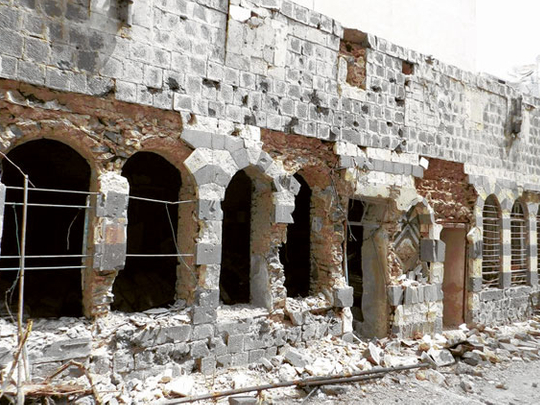
Beirut On its towering hilltop perch, the Krak des Chevaliers, one of the world's best preserved Crusader castles, held off a siege by the Muslim warrior Saladin nearly 900 years ago. It was lauded by Lawrence of Arabia for its beauty and has been one of the crown jewels of Syria's tourism.
But it has fallen victim to the chaos of Syria's uprising and the crackdown against it by President Bashar Al Assad's regime. Recently, gunmen broke into the castle, threw out the staff and began excavations to loot the site, says Bassam Jammous, general director of the Antiquities and Museum Department in Damascus.
Syria's turmoil is threatening the country's rich archaeological heritage, experts warn. Some of the country's most significant sites have been caught in the crossfire in battles between regime forces and rebels. Others have been turned into military bases, raising archaeologists' fears of damage. Regime shelling of neighbourhoods where the opposition is holed up has smashed historic mosques, churches and souks, or markets. Looters have stolen artefacts from excavations and museums.
Trading blame
In one of the most egregious examples, shells thudded into the walls of the 12th century Al Madeeq Citadel, raising flames and columns of smoke as regime forces battled with rebels in March. The bombardment punched holes in the walls, according to online footage of the fighting.
Local activists said regime forces carried out the assault and afterward moved tanks into the hilltop castle. Later footage showed bulldozers knocking through part of the walls to create an entrance.
The government and opposition have traded blame for damage and looting of sites around the country. But a group of European and Syrian archaeologists tracking the threats through witness reports from the ground says that in several cases, government forces have directly hit historic sites and either participated in or turned a blind eye to looting.
"We have facts showing that the government is acting directly against the country's historical heritage," said Rodrigo Martin, a Spanish archaeologist who has led past research missions inside Syria.
What's happening is reminiscent of Iraq's chaos in the wake of Saddam Hussain's 2003 fall, when Baghdad's major museum was looted, and of Egypt, where looting has reportedly increased at archaeological sites around the country in the turmoil since President Hosni Mubarak was toppled last year.












